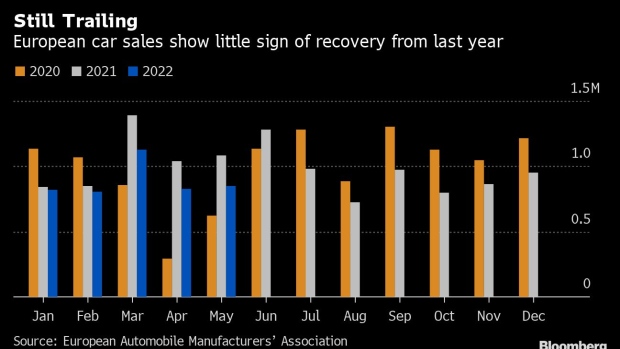Jun 16, 2022
Europe Car Sales Decline in May to Fall for Almost A Year
, Bloomberg News

(Bloomberg) -- Europe’s new-vehicle sales slumped for an 11th consecutive month as record inflation and falling consumer confidence joined prolonged supply-chain disruptions.
Registrations fell 12.5% to 948,149 vehicles in May, the European Automobile Manufacturers’ Association said Thursday. Hardest-hit among major automakers was Volkswagen AG, which saw sales drop by more than 21% from the same month last year.
After nearly a year of decline, carmakers have recently seen glimmers of improvement, reporting that some supply constraints -- such as the lack of semiconductors -- are beginning to ease. A Bloomberg Intelligence report predicts European car sales will pick up in the second half of this year.
Even so, the depth of sales losses during the first half of the year have taken a toll. Forecasters at LMC Automotive cut their estimate for full-year Western European passenger-car sales again this month, the fifth time this year. They now expect 9.8 million deliveries this year, a 7.4% decline from 2021. In January, LMC predicted sales would grow by 9%.
“Supply chain issues will constrain results through this year and into 2023,” LMC said in a report this month.
But even as supply chains gradually improve, weakening demand due to record inflation and a slowing global economy are clouding sales forecasts.
“The demand side situation is becoming increasingly gloomy,” LMC said, noting that consumer confidence in Europe is now lower than at the start of the pandemic in early 2020.
To make up for lost sales, many carmakers have raised prices and shifted production to their most expensive models that yield greater profits. But that strategy could face limits as consumers struggle more broadly with inflation. According to a recent poll by public broadcaster ARD, nearly half of all Germans plan to cut back spending this year.
Registrations fell by about 10% in both Germany and France, and by more than 20% in the UK.
©2022 Bloomberg L.P.





